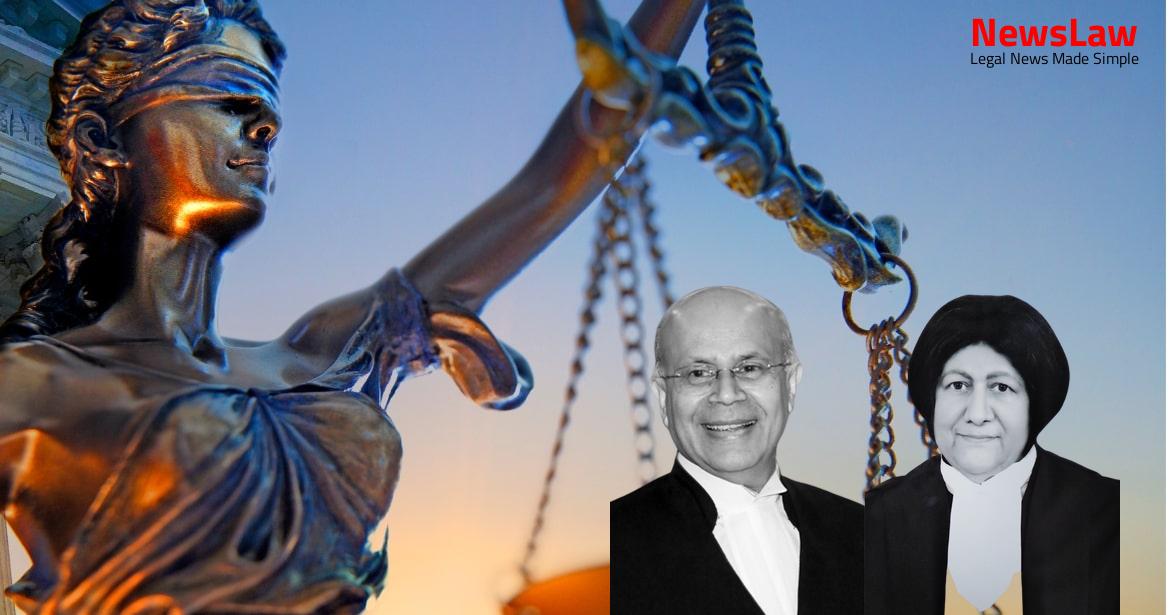The case of Appellant vs. Armed Forces Tribunal revolves around the misdiagnosis of AIDS, leading to the appellant’s premature discharge from service. Despite multiple appeals and challenges, the appellant faced discrimination and denial of disability status and pension due to the misdiagnosis. In a landmark decision, the appellant has been granted compensation for the wrongful termination, bringing justice to the ordeal faced. #LegalCase #AIDS #Misdiagnosis #ArmedForces
Facts
- The appellant approached the Madhya Pradesh High Court to quash the discharge order dated 26 December, 2001, and seek reinstatement with all benefits.
- He was denied disability pension due to AIDS being categorized as a self-inflicted condition.
- The appellant applied for a Review Medical Board with the DGAFMS but was rejected based on the Army’s prevailing policy in the 1992 Guidelines.
- The IMB confirmed his diagnosis of AIDS and he was discharged from service on medical grounds in 2001.
- The appellant tested positive for HIV and was treated for neuro-tuberculosis, leading to gross limitations in physical capacity and stamina.
- The appellant challenged the rejection of a fresh Medical Board before the Supreme Court through a civil appeal.
- The IMB confirmed the findings of the Medical Report and was rightly constituted with the required experts.
- An order dated 01 April, 2009 allowed the appellant to withdraw his appeal, directing him to avail of available statutory remedies.
- A Division Bench of the High Court, in an order dated 28 March, 2007, reversed the previous order, stating that the appellant’s discharge from service was valid under Rule 13 of the Rules, as AIDS would incapacitate his physical capacity.
- An application for review of the Division Bench’s order was dismissed on 27 August, 2007.
- The appellant challenged the order passed by the DGAFMS before the AFT, which in the impugned judgment rejected his prayer based on the Medical Report’s conclusions of CNS Tuberculosis and Immune Surveillance for HIV.
Also Read: MSSIDCL v. SSPL: Compound Interest Dispute
Arguments
- Appellant’s survival was attributed to natural variation in disease course, not misdiagnosis
- Appellant was misdiagnosed with tuberculosis instead of double vision
- Appellant’s CD4 cell count remained above 200/mm as per Army’s 2003 Guidelines
- Appellant remained asymptomatic without anti-retroviral therapy, indicating no development of AIDS
- Contention of wrongful discharge based on wrong diagnosis and error in medical report
- Appellant’s response to anti-tuberculosis treatment confirmed the diagnosis at the time
- Refutation of appellant’s claim of misdiagnosis with AIDS due to CD4 cell count above 200/mm
- AFT decision deemed CD4 count of 379 cells/mm as marginal, not entitling appellant to be declared AIDS-free
- The respondent argued that AIDS would result in a deterioration of the appellant’s health.
- The appellant was discharged under the P5 category for being found grossly unfit for medical service.
Also Read: Case Summary: Nirmal Premkumar v. State Rep. By Inspector of Police
Analysis
- Appellant was diagnosed with HIV in 2001 but showed no symptoms of AIDS that would render him unfit for service.
- Despite the stigma associated with HIV, the appellant was treated unfairly by the authorities and denied disability status and pension based on a self-inflicted disease designation.
- The Medical Board’s rejection of the appellant’s plea for disability status was arbitrary and lacked compassion.
- The dismissal and wrongful diagnosis of AIDS led to the appellant’s premature discharge from service at the age of 27.
- The appellant’s repeated attempts to prove his CD4 cell count above the AIDS-defining threshold were disregarded by the authorities.
- The appeal court found the appellant to be asymptomatic with no need for anti-retroviral therapy, contradicting the original AIDS diagnosis.
- The appellant’s discharge from service caused psychological, financial, and physical trauma that could not be fully compensated even with monetary relief.
- The appellant’s continued survival without serious illness cast doubt on the original diagnosis and the respondent’s adherence to medical standards.
- The negligence and discriminatory practices of the authorities were evident throughout the appellant’s case, despite multiple opportunities for correction.
- Monetary compensation is an appropriate remedy for the infringement of the fundamental right to life by public servants.
- Compensation is crucial for assuring the morale of armed forces and valuing the lives of military personnel.
- Quantum of compensation should consider the sufferings of the injured person and their inability to lead a full life.
- The approach to determining compensation should be broad-based and aim for ‘just compensation’.
- Joining the armed forces involves a conscious decision to put lives on the line and be prepared for ultimate sacrifice.
- The judicial process plays a crucial role in removing injustices in society, with the Supreme Court having the jurisdiction to ensure justice.
- State functionaries, including the armed forces, have a duty to maintain high standards of safety and well-being.
- The appellant is entitled to pension as if he had continued in service as a Havaldar and retired after completing the required years of service.
- The appellant cannot raise any plea regarding promotion as he did not continue in service beyond a certain date.
- The appellant was misdiagnosed with AIDS, causing him extreme mental agony due to social stigma and fear of imminent death.
- A lump sum compensation of Rs.50,00,000/- is awarded to the appellant for wrongful termination, leave encashment dues, medical expenses, and social stigma faced.
- The compensation, though inadequate for the ordeal suffered, may provide some relief to the appellant.
Also Read: Analysis of Agency Relationships in Taxation
Decision
- The calculation of the pension for the appellant should include allowances and increments he would have received if he had continued serving until his retirement as Havaldar.
- The impugned judgment is overturned, and the civil appeal is granted in favor of the appellant.
- Wishes for a long and healthy life are extended to the active appellant, who is now engaged in his own business.
Case Title: SATYANAND SINGH Vs. UNION OF INDIA . (2024 INSC 236)
Case Number: C.A. No.-001666-001666 / 2015



